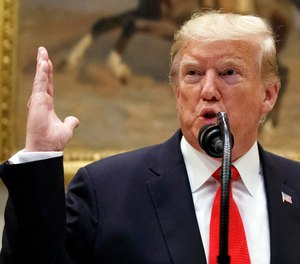
The state will use the funding to provide families with treatment and prevention resources, while also funding data collection efforts
By Malachi Barrett
MLive.com, Walker, Mich.
LANSING, Mich. — Michigan will receive a $27.9 million federal grant to help communities respond to the epidemic of opioid addiction.
The U.S. Department of Health and Human Services announced $1.8 billion in federal funds will help states increase access to medication, treatment and mental health resources. President Donald Trump said Wednesday the funds will be delivered to communities where the help is most needed, with the hope of “building a drug-free future."
“We’re on our way; it sounds like a big statement,” Trump said. “And it’s a problem that every country is having, or most countries, certainly. But it’s something that I saw firsthand during the (2016) campaign, and I couldn’t believe when I looked at certain states, in particular, how bad it was. We want a safe and healthy future for every American family.”
The Michigan Department of Health and Human Services will use the funding to provide families with treatment and prevention resources, while also funding a data collection effort. U.S. Sens. Debbie Stabenow, D-Lansing, and Gary Peters, D-Bloomfield Township, celebrated the grants, saying Michigan families will benefit from improved access to addiction help.
“In every corner of our state, the opioid crisis has impacted the lives of too many Michiganders,” Peters said in a statement. “I’m pleased that Michigan is receiving this federal funding to strengthen prevention efforts and access to treatment."
A $900 million chunk of the new grants will fund a separate three-year cooperative effort between states and the Center for Disease Control to track overdose data, promote awareness of the opioid crisis and bolster prevention programs and response initiatives.
Michigan’s share of the new funding is significantly larger than a $16.3 million federal grant MDHHS received in 2017. The new grants come from money Trump secured from Congress last year.
Nearly 3,000 Michigan residents received treatment services from 2017-18, according to a report outlining the grant’s accomplishments. The grant also funds overdose education, distribution of Narcan kits, a statewide media campaign, a prevention initiative for indigenous tribes, and various treatment and recovery programs.
Opioid overdoses have been killing Michigan residents at an increasing rate during the last two decades. The number of people who died from a drug overdose involving illegal or prescription opioids increased 1,450% from 1999 to 2016.
More recently, deaths involving synthetic opioids like fentanyl have also been on the rise.
The president said $6 billion in new funding has been secured to respond to the crisis since.
Health and Human Services Secretary Alex Azar said an estimated 1.27 million Americans are receiving medication-assisted treatment in 2019.
Trump also touted his efforts to stop fentanyl from entering the U.S. from China and Mexico. The president recently complained about the Chinese government not doing enough to stop fentanyl from killing Americans, though China said this week it is making an extensive effort to control the synthetic opioid and should not be labeled the main origin of fentanyl to the U.S.
Nationally, drug overdose deaths dipped 5% between 2017 and 2018, the first decline in drug overdose deaths since 1990.
“My administration is determined to use every resource at our disposal to smash the grip of addiction,” Trump said.
———
©2019 MLive.com, Walker, Mich.
McClatchy-Tribune News Service
Copyright © 2024 EmsGrantsHelp.com. All rights reserved.
